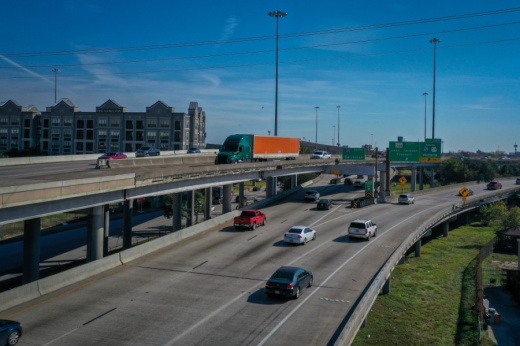For the second time in three months, Houston-area politicians and transportation leaders attempted to come to an agreement on the terms of the planned $7 billion overhaul of I-45 through downtown Houston and much of the city’s north side.
In an 11-14 vote, members of a transportation subcommittee of the Houston-Galveston Area Council, which funds a portion of the project, approved a resolution between the committee and the Texas Department of Transportation to work collaboratively on TxDOT’s plans for I-45. The agreement was originally proposed as a legally binding document known as a memorandum of understanding, but after months of talks between the parties involved, TxDOT lawyers’ advised the agency not to sign off on it. The effort instead shifted to coming to a nonbinding resolution.
Those opposing the resolution criticized it as toothless and questioned whether it actually requires TxDOT to seriously consider feedback from area leaders and community members.
“What was presented today was a vacant and hollow document compared to what we have seen before,” said David Robinson, Houston City Council member and HGAC transportation representative.
The proposal, formally known as the North Houston Highway Improvement Project, has elicited strong reactions from some Houston residents and elected officials for its proposal to reroute and expand the highway through East Downtown and the Northside while abandoning its path through Midtown.
Advocacy groups, such as Stop TxDOT I-45 and LINK Houston, have argued the project will have disproportionately negative impacts on Black and Hispanic communities along its route. Theirs and others’ opposition to the proposal spurred months of public input processes led by the city of Houston as well as to an effort among regional leaders to form an agreement with TxDOT on the terms of the project.
Supporters of the proposal, including representatives of the Greater Houston Partnership, transportation coordinating organization TAG Houston, and the North Houston Association business network, spoke out during the comment period.
“I have heard opposers of the NHIPP speak about the need to value people over cars and that is our goal as well,” NHA President Marlisa Briggs said. “Multimodal solutions are extremely important, but the region simply has not grown to handle transit as the standalone solution, nor do we have the financial resources to logistically reach every commuter in the greater Houston region.”
Those who voted in favor of the resolution—mostly representatives of the region’s suburban cities and counties—deemed it a first step to keep the project in motion. Some, including Waller County Commissioner Justin Beckendorff, expressed concern that ongoing disputes over the project’s design were contributing to delays.
“In this resolution, it encourages TxDOT to continue to have those conversations and meet those concerns,” Beckendorff said. “At least now, we’ve put it in writing. We want TxDOT to continue to come to the table.”
Sugar Land Mayor Joe Zimmerman also referenced a lawsuit filed by Harris County against TxDOT regarding the agency’s Final Environmental Impact Statement, which signifies one of the last steps in the project’s approval process and which Harris County Attorney Christian Menefee alleges did not adequately take into account years of community advocacy.
County officials announced the legal action March 11, about two months after talks between H-GAC leaders and TxDOT had been temporarily put on hold.
The Federal Highway Administration also filed an investigation into the project plans, citing the possibility of civil rights violations within the project’s design.
Dozens of members of the public called into the virtual meeting to express similar concerns.
“I’m from urban, Black and brown communities and the working poor and was raised by a single mother with one car," said Melissa Martinez, a student at the University of Houston. Going about our livelihood has been so rough dealing with transportation issues and lack of access to public transportation. It hurts me that a project like this exists because it puts people like me at even more of a disadvantage, ... and these marginalized communities are still going to be affected by the legacy of environmental racism of this project.”
As of the March 26 HGAC meeting, regional leaders were still unsure as to how the actions of the county and federal governments’ would impact the overall scope and timeline of the project.
“TxDOT is committed to continuing to meet with stakeholders and accepting public input as it proceeds through future project development phases,” TxDOT Houston District Engineer Eliza Paul said in a news release when one of the last stages of the project’s approval process was finalized in February. “TxDOT will continue to do all we can to help make the NHHIP a success as the project continues to be developed.”





